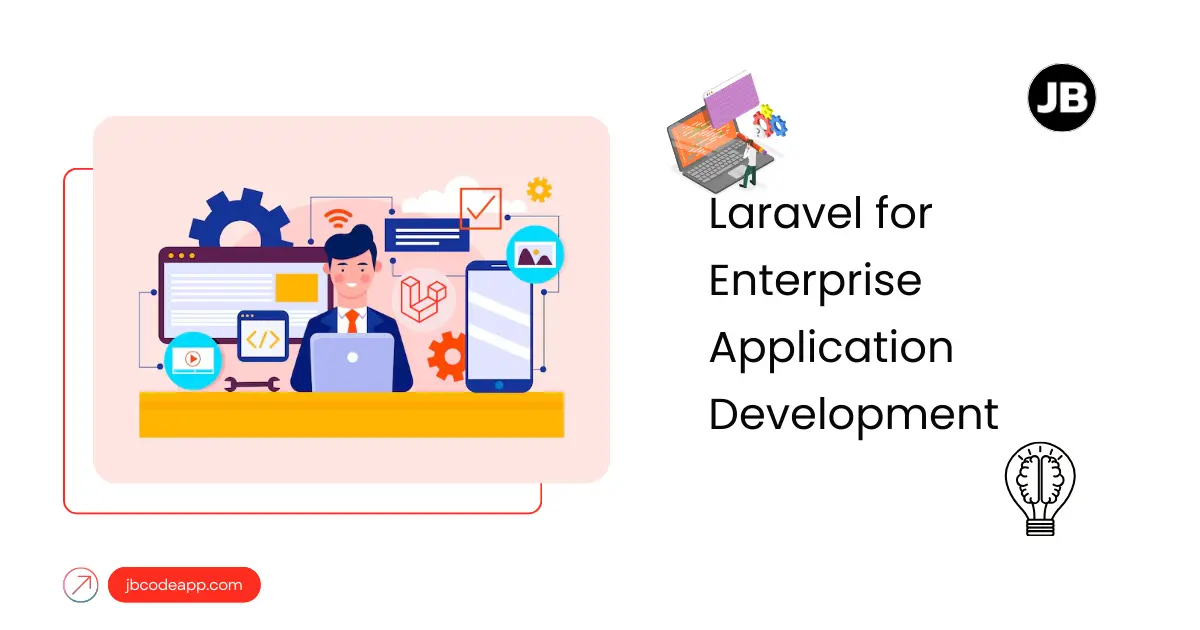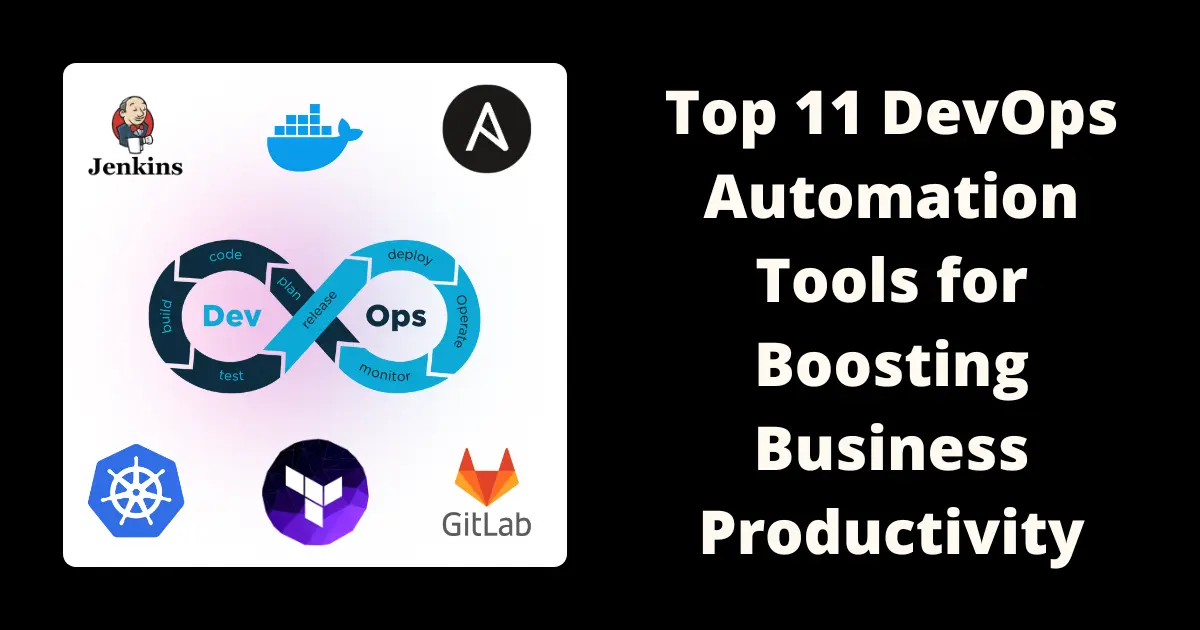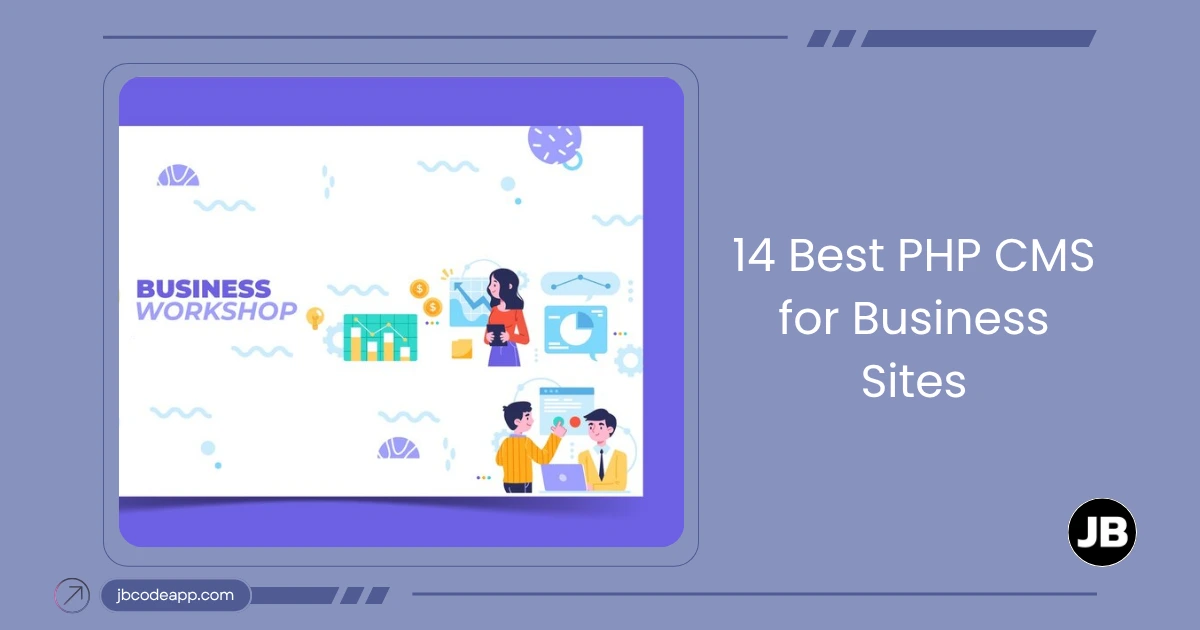Laravel for Enterprise Application Development and Scalable Solutions

Overview
Table of Contents
- What is Laravel?
- Why Choose Laravel for Enterprise Applications?
- Why Choose Laravel for Enterprise Applications?
- Key Features Beneficial for Enterprises
- How Laravel Enhances Enterprise Application Development
- Challenges Addressed by Laravel in Enterprise Solutions
- Integrating Third-Party Services with Laravel
- Laravel's Market Presence and Community Support
- Case Studies: Enterprises Leveraging Laravel
- Conclusion
- FAQs
Enterprise applications are the backbone of modern businesses. Whether it’s enterprise workflow software, content management solutions, or large-scale ERP systems—scalability, reliability, and performance are key. Laravel, a PHP-based framework, has gained significant traction in enterprise solution architecture.
“Laravel is no longer just a framework for small apps it’s an enterprise powerhouse.” – Senior Software Architect
What is Laravel?
Laravel is an open-source PHP framework designed for web application development following the Model-View-Controller (MVC) architectural pattern. It provides an elegant syntax and a rich set of features that simplify common tasks such as routing, authentication, and caching.
Key Features:
MVC Architecture: Promotes organized code structure, enhancing maintainability.
Eloquent ORM: Simplifies database interactions with an intuitive syntax.
Blade Templating Engine: Facilitates the creation of dynamic and reusable views.
Artisan CLI: Offers command-line tools for efficient development workflows.
These features make Laravel a suitable choice for developing complex enterprise applications that require scalability and maintainability.
Why Choose Laravel for Enterprise Applications?
Laravel stands out as a preferred framework for enterprise application development due to its comprehensive ecosystem and robust features.
Advantages:
Scalability: Laravel supports horizontal scaling, allowing applications to handle increased traffic seamlessly.
Security: Built-in features like CSRF protection, SQL injection prevention, and password hashing ensure robust security.
Cost-Effectiveness: Being open-source, Laravel reduces licensing costs, making it a budget-friendly option for enterprises.
Rapid Development: With features like Artisan CLI and Eloquent ORM, Laravel accelerates the development process.
These benefits align with the needs of enterprises seeking efficient and secure application development.
Key Laravel Advantages:
- Modular structure using Composer packages
- Built-in support for authentication, sessions, routing, and caching
- Support for enterprise-level REST APIs and GraphQL
- Massive developer community and ecosystem
Why Choose Laravel for Enterprise Applications?
Enterprises require more than just speed—they need stability, security, and long-term scalability. Laravel fits this bill perfectly.
Reasons Laravel Stands Out:
- Enterprise Workflow Automation: Automate business processes with queues, events, and job scheduling.
- Customization Ready: Laravel supports tailored ERP and CRM builds with custom logic and workflows.
- Integration Support: Laravel easily connects with tools like Salesforce, AWS, and legacy systems.
Quote:
“Laravel’s ecosystem makes complex enterprise workflows feel simple.” – Lead Developer at a Fortune 500 firm
Key Features Beneficial for Enterprises
Laravel is packed with features that cater directly to the complex needs of modern enterprise applications. Its elegant syntax, built-in tools, and modular system architecture empower development teams to build scalable, secure, and efficient software at a faster pace.
Whether you're building enterprise workflow software, customized ERP solutions, or enterprise content management solutions, Laravel provides the foundation and flexibility you need.
Blade Templating Engine:
Blade is Laravel’s powerful and lightweight templating engine. It allows developers to build modular and reusable UI components with a clean and readable syntax.
-
Enables faster front-end development
-
Supports template inheritance and components
-
Integrates easily with modern JavaScript frameworks like Vue.js and Alpine.js
For enterprise apps with complex UI needs like dashboards or document editors, Blade offers a blend of flexibility and control.
Laravel Echo & Broadcasting:
Laravel Echo, combined with broadcasting services like Pusher or WebSockets, allows real-time features like notifications, chat, and live dashboards.
-
Essential for real-time collaboration tools
-
Enhances enterprise workflow automation
-
Supports event-driven UI updates across teams
“Laravel Echo allowed us to build real-time internal communication tools without adding third-party plugins.” — Product Lead at a fintech company
Advanced Security:
Security is mission-critical for any enterprise application. Laravel comes equipped with built-in protections:
-
CSRF (Cross-Site Request Forgery) protection
-
XSS (Cross-Site Scripting) filtering
-
SQL Injection prevention using Eloquent ORM
-
Passwords stored using bcrypt hashing
These features ensure your enterprise solutions meet compliance and regulatory standards while keeping sensitive data secure.
Laravel Sanctum & Passport:
Laravel supports secure API authentication with Sanctum (for SPAs) and Passport (for OAuth2).
-
Ideal for microservice-based enterprise architectures
-
Enables secure access tokens and session authentication
-
Perfect for mobile apps, partner integrations, and third-party API gateways
Sanctum is lightweight and ideal for internal tools, while Passport is robust for full-scale OAuth integration.
Realization:
Using Laravel means less time on boilerplate and more on business logic—perfect for enterprise agility.
How Laravel Enhances Enterprise Application Development

Laravel's modular architecture and rich ecosystem make it an ideal framework for building scalable, secure, and enterprise-ready applications. For businesses looking to implement enterprise solutions, Laravel supports complex functionalities like modular service layers, real-time monitoring, and multi-environment deployments.
Whether you're developing enterprise workflow software, custom ERP systems, or content management portals, Laravel reduces development time and boosts maintainability—key traits for modern enterprises.
Enhancements:
Modular Architecture:
Laravel promotes the use of service containers and modular development, enabling teams to build reusable, decoupled components. This flexibility supports large codebases and distributed teams, perfect for enterprise solution architecture.
API Development:
Laravel makes API-first development easy with tools like Laravel Sanctum and Passport, enabling authentication for microservices, mobile apps, and third-party systems. It ensures smooth enterprise workflow automation.
Real-Time Monitoring:
Laravel Telescope provides deep visibility into requests, database queries, queued jobs, and more. This is vital for enterprise-grade applications needing live performance diagnostics and rapid issue resolution.
Microservices Support:
Laravel is compatible with microservice architecture. It can be paired with Lumen (Laravel’s micro-framework) to build scalable APIs or integrate with Docker and Kubernetes setups, boosting enterprise solution architecture for distributed systems.
These enhancements make Laravel a versatile framework for enterprise application development.
Overview Points:
- Development Speed: Artisan CLI and scaffolding tools make development 2x faster.
- Maintainability: Structured folder architecture helps large teams work seamlessly.
- Enterprise Workflow Software Integration: Laravel supports modular extensions for CRM, ERP, and analytics tools.
Laravel Features vs Enterprise Needs
| Enterprise Requirement | Laravel Solution |
|---|---|
| High security | Built-in CSRF, hashed passwords |
| Scalability | Laravel Horizon, Redis support |
| API-First Development | Laravel Sanctum & Passport |
| Real-time apps | Laravel Echo with WebSockets |
composer require laravel/passport
Challenges Addressed by Laravel in Enterprise Solutions

Laravel effectively addresses common challenges faced in enterprise application development.
Common Enterprise Challenges Laravel Solves:
Challenges and Solutions:
-
Handling High Traffic: Laravel's caching mechanisms and support for load balancing help manage high user loads.
-
Data Security: Advanced security features protect against common vulnerabilities.
-
Maintenance and Updates: Laravel's structured codebase simplifies ongoing maintenance and feature additions.
-
Complex Workflows: Laravel Workflow packages enable the management of complex business processes.
-
Complex Access Control: Role-based permissions via Laravel Gates and Policies.
-
Large Data Handling: Eloquent ORM handles millions of records with pagination and lazy loading.
-
Performance Bottlenecks: Laravel Queue & Redis support asynchronous tasks.
Transform Your Workflow with Laravel
Let's talk!
Integrating Third-Party Services with Laravel
Laravel simplifies the integration of third-party services essential for enterprise solutions. From payment processing to cloud storage and communication tools, Laravel provides clean, consistent APIs and a robust ecosystem that reduces development time and ensures seamless interoperability.
Enterprise applications often rely on a suite of external tools to operate efficiently. Laravel’s support for various Composer packages and first-party features makes these integrations more manageable, reliable, and scalable—perfect for enterprise workflow automation and enterprise content management solutions.
Integration Capabilities:
Here’s a breakdown of the most commonly integrated service categories in Laravel-based enterprise applications:
Payment Gateways:
Laravel provides out-of-the-box support for integrating payment gateways like Stripe, PayPal, and Razorpay through packages such as Laravel Cashier. These are essential for subscription-based platforms, billing automation, and customized ERP solutions.
Key Benefits:
- Handles subscription billing, coupons, and invoices
- Secure payment processing
- Easy refund handling and webhook support
“Cashier allowed us to plug in Stripe with just a few lines. It’s built for SaaS and enterprise payments.” – Tech Lead, FinTech Startup
Email Services:
Laravel supports a variety of email services, including Mailgun, SendGrid, Amazon SES, and SMTP-based services, through its clean and extensible Mail facade.
Enterprise Benefits:
- Reliable transactional email delivery
- Marketing automation support
- Queue and scheduling support for large campaigns
Pro Tip: Use Laravel’s queue system to handle high-volume email sending without delays.
Cloud Storage:
Integrate AWS S3, Google Cloud Storage, or Azure Blob Storage using Laravel’s filesystem abstraction. Laravel’s Storage facade makes it incredibly simple to store, retrieve, and secure files in the cloud.
Ideal for:
-
Document management in enterprise content management solutions
-
User-uploaded file storage in secure environments
-
Media-heavy applications with global access
Communication Tools:
Modern enterprise apps need real-time communication. Laravel makes it easy to integrate with tools like Slack, Twilio, Zoom, and Microsoft Teams using event broadcasting and API services.
Use Cases:
-
Team notifications via Slack
-
Customer support via Twilio SMS
-
Web meetings via Zoom integration
-
Role-based communication and alerts
“Laravel made integrating our ERP system with Stripe and Slack notifications painless.” — CTO at a mid-size SaaS firm

Laravel's Market Presence and Community Support
Laravel is backed by a global community, extensive documentation, and top development companies.
Market Facts:
- Over 1.3 million developers use Laravel.
- Laravel conferences and Laracasts offer ongoing training.
- Major brands like Invoice Ninja and Alison use Laravel.
Laravel Examples in Enterprise:
- Alison: A massive e-learning platform
- OctoberCMS: Built for content-heavy enterprise portals
- Startups: Use Laravel for customized ERP solutions from day one
Community Highlights:
-
Extensive Documentation: Comprehensive guides and tutorials facilitate learning and development.
-
Active Forums: Community forums provide support and knowledge sharing among developers.
-
Regular Updates: Laravel's consistent updates ensure it stays aligned with modern development practices.
-
Global Conferences: Events like Laracon foster community engagement and knowledge exchange.
This vibrant community ensures that Laravel remains a reliable and up-to-date framework for enterprise development.
Case Studies: Enterprises Leveraging Laravel
Real-World Use Cases:
Several enterprises have successfully implemented Laravel in their technology stack, benefiting from its scalability and robust features.
-
Company: Invoice Ninja
Built for invoicing and client management—scalable up to 100,000+ clients using Laravel Queues. -
Project: World Walking
A charity application scaling to thousands of daily users thanks to Laravel’s performance tuning.
Conclusion
Laravel is more than just a PHP framework—it’s an enterprise-ready development ecosystem. Whether you're building enterprise content management solutions, workflow automation tools, or customized ERP solutions, Laravel offers the flexibility, power, and scalability your enterprise needs.
If you're looking for the best Laravel development company, partnering with Laravel experts can make the journey smooth and successful.
Need an enterprise solution built with Laravel?
FAQs
1. Is Laravel suitable for building enterprise applications?
Yes, Laravel offers scalability, security, and a rich set of features that make it ideal for enterprise application development.
2. Can Laravel handle high-traffic enterprise applications?
Absolutely. Laravel's caching mechanisms and support for load balancing enable it to manage high user loads effectively.
3. Does Laravel support integration with third-party services?
Yes, Laravel simplifies the integration of various third-party services, including payment gateways, email services, and cloud storage.
4. How does Laravel ensure the security of enterprise applications?
Laravel includes built-in security features like CSRF protection, SQL injection prevention, and password hashing to safeguard applications.
5. Is Laravel suitable for developing customized ERP solutions?
Yes, Laravel's modular architecture and extensive ecosystem make it suitable for developing customized ERP solutions tailored to specific business needs.
6. What kind of community support does Laravel offer?
Laravel has an active community that provides extensive documentation, forums, and regular updates, ensuring continuous improvement and support.
7. Can Laravel be used for enterprise content management solutions?
Yes, Laravel supports the development of content management systems, offering features like role-based access control and multilingual support.
8. Are there any real-world examples of enterprises using Laravel?
Yes, companies like FusionInvoice and Unipage have successfully implemented Laravel in their enterprise applications.
9. Does Laravel support workflow automation in enterprise applications?
Yes, Laravel Workflow packages enable the management and automation of complex business processes within enterprise applications.
10. How does Laravel facilitate rapid development for enterprises?
Laravel's features like Artisan CLI and Eloquent ORM accelerate the development process, allowing for quicker deployment of enterprise applications.















